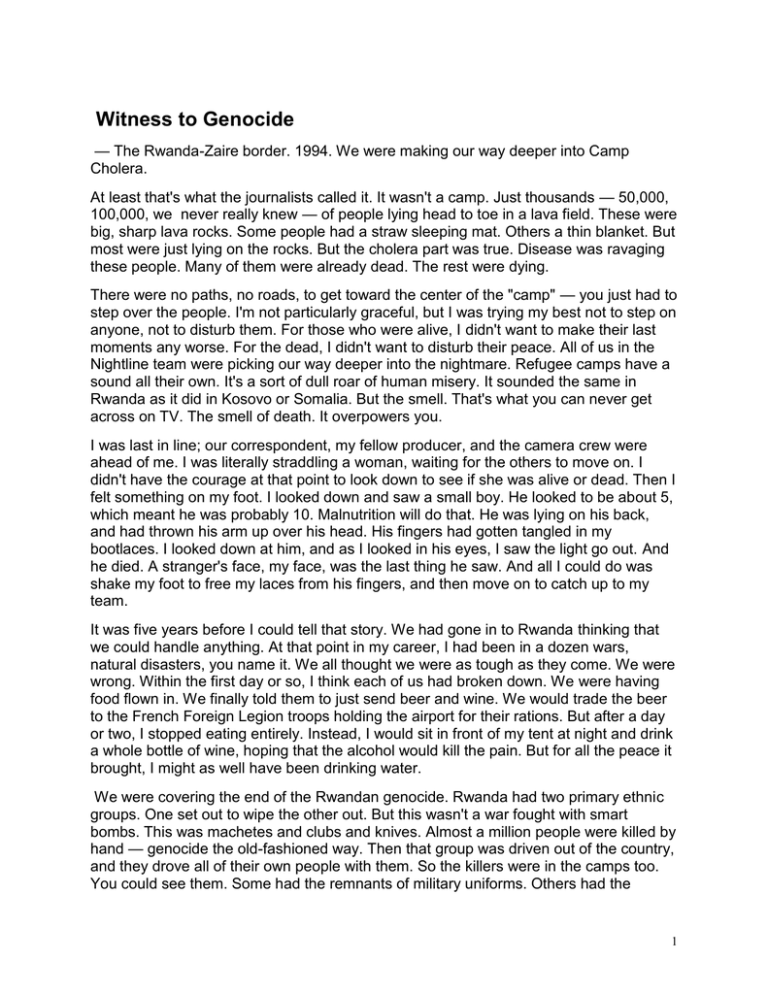Witness to Genocide
advertisement

Witness to Genocide — The Rwanda-Zaire border. 1994. We were making our way deeper into Camp Cholera. At least that's what the journalists called it. It wasn't a camp. Just thousands — 50,000, 100,000, we never really knew — of people lying head to toe in a lava field. These were big, sharp lava rocks. Some people had a straw sleeping mat. Others a thin blanket. But most were just lying on the rocks. But the cholera part was true. Disease was ravaging these people. Many of them were already dead. The rest were dying. There were no paths, no roads, to get toward the center of the "camp" — you just had to step over the people. I'm not particularly graceful, but I was trying my best not to step on anyone, not to disturb them. For those who were alive, I didn't want to make their last moments any worse. For the dead, I didn't want to disturb their peace. All of us in the Nightline team were picking our way deeper into the nightmare. Refugee camps have a sound all their own. It's a sort of dull roar of human misery. It sounded the same in Rwanda as it did in Kosovo or Somalia. But the smell. That's what you can never get across on TV. The smell of death. It overpowers you. I was last in line; our correspondent, my fellow producer, and the camera crew were ahead of me. I was literally straddling a woman, waiting for the others to move on. I didn't have the courage at that point to look down to see if she was alive or dead. Then I felt something on my foot. I looked down and saw a small boy. He looked to be about 5, which meant he was probably 10. Malnutrition will do that. He was lying on his back, and had thrown his arm up over his head. His fingers had gotten tangled in my bootlaces. I looked down at him, and as I looked in his eyes, I saw the light go out. And he died. A stranger's face, my face, was the last thing he saw. And all I could do was shake my foot to free my laces from his fingers, and then move on to catch up to my team. It was five years before I could tell that story. We had gone in to Rwanda thinking that we could handle anything. At that point in my career, I had been in a dozen wars, natural disasters, you name it. We all thought we were as tough as they come. We were wrong. Within the first day or so, I think each of us had broken down. We were having food flown in. We finally told them to just send beer and wine. We would trade the beer to the French Foreign Legion troops holding the airport for their rations. But after a day or two, I stopped eating entirely. Instead, I would sit in front of my tent at night and drink a whole bottle of wine, hoping that the alcohol would kill the pain. But for all the peace it brought, I might as well have been drinking water. We were covering the end of the Rwandan genocide. Rwanda had two primary ethnic groups. One set out to wipe the other out. But this wasn't a war fought with smart bombs. This was machetes and clubs and knives. Almost a million people were killed by hand — genocide the old-fashioned way. Then that group was driven out of the country, and they drove all of their own people with them. So the killers were in the camps too. You could see them. Some had the remnants of military uniforms. Others had the 1 swagger of men who have killed and found that they liked it. You could see that in their eyes. We stayed away from them. The Peacekeeper There had been a U.N. peacekeeping force in Rwanda. The commander, Romeo d'Allaire, a Canadian, had pleaded for enough troops to stop the genocide. But no one would listen to him. No one wanted to get involved. Rwanda wasn't part of anyone's national interests. He was told to remain neutral. To not take sides. And then finally, the troops were pulled out. The genocide continued. The commander, destined to be Canada's top soldier, was destroyed by his experiences. He was found on a park bench in Canada, blind drunk, screaming for someone to kill him. I know why. I know what his nightmares look like. We'll tell his story tonight. It asks a question that makes people uncomfortable: Don't we have an obligation, a moral obligation, to intervene? To save those who can't save themselves? It's an incredibly powerful show. But I have to admit that when I first screened it in the edit room, it was all I could do to stay and keep watching. Looking at the pictures again brought back that smell, those sounds. I was amazed at what power the pictures had over me. Trying to drag me back into the nightmare. But I don't need pictures to take me back there. I have a guide. Every night, when I lie down in my big bed in my nice suburban house, and I close my eyes to sleep, that little boy comes to me and tugs on my bootlaces. And every night he asks me why we let this happen, and I have no answer. And every night I pray that it will be the last time that he comes for me. But I know better. Leroy Sievers is the executive producer of Nightline. Copyright © 2001 ABC News Internet Ventures. 2

